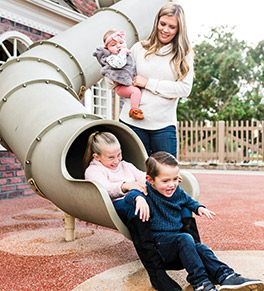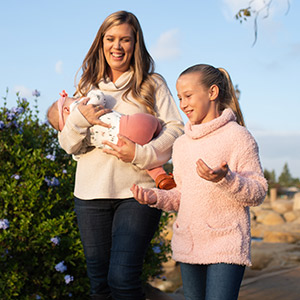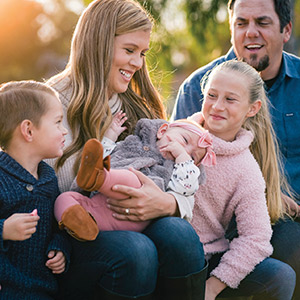Young mom-to-be survives rare ovarian cancer

When 22-year-old Tatum Miller signed up for a UCI Health study of expectant moms, she thought participating would be a great way to document her first pregnancy.
“I went for my first appointment thinking I would get a few more pictures of my baby,” Miller says.
She never imagined the ultrasound she had that day in May 2011 would ultimately save her life and that of her baby girl — now a spunky, baseball-playing 10-year-old named Payton.
When UCI Health sonographer Valerie Pham detected a mass on Miller’s ovary, she alerted Dr. Judith Chung, a UCI Health obstetrician specializing in high-risk pregnancies who was helping to conduct the study. Miller was stunned.
“I didn’t have any symptoms,” she recalls. “But when someone tells you there’s something on your ovaries, you take it seriously.”
A baseball-sized tumor
The mass — nearly the size of a baseball — turned out to be granulosa cell ovarian cancer, a rare type of cancer that accounts for only 2% of all ovarian tumors. Its symptoms can include vague bloating, discomfort in the pelvis or bladder, and bowel changes. Miller, then 16 weeks pregnant, had none of them.
Dr. Robert E. Bristow, then chief of UCI Health gynecologic oncology, recommended surgery as soon as possible, given the tumor's size and aggressiveness. But because the tumor was situated beneath the uterus, he couldn’t use minimally invasive laparoscopic techniques to remove it.
Instead, a month after the mass was first detected, he performed open surgery, gently pushing aside the uterus to remove the tumor and the ovary to which it was attached.
There is a risk to such a procedure, which in the best case is performed a bit later in the second trimester, says Bristow, who told Miller that the chance of the cancer worsening if she waited tipped the balance in favor of proceeding immediately.
A miracle baby 'saved my life'
“Going into the surgery, I was really nervous — there was a chance I could lose my child,” says Miller, then a hairdresser. “Dr. Bristow made me feel really comfortable. He explained
what would happen step-by-step. Afterward he came into the recovery room and told me the baby was safe.”
The ability to successfully intervene during Miller’s pregnancy to take out the tumor and make sure it was in the early stages was key to the health of mother and child, says Bristow, a nationally regarded gynecologic oncologist who leads the UCI School of Medicine’s Department of Obstetrics & Gynecology.
“If we waited to remove the tumor until she delivered several months later, we risked it developing into a much higher stage cancer,” he says.
Moreover, the tumor may not have been detected until much later in the pregnancy, if at all, had the expectant mother not chosen to participate in the study, Chung says.
“It’s a miracle they found it,” says Miller, her voice thick with emotion in retelling the story more than 10 years later. “I call Payton my miracle baby — she saved my life.”
And because it was an early-stage cancer, she did not have to undergo other treatments such as chemotherapy or radiation. Ten years later, she remains free of cancer and sign of cancer. Bristow says her risk of recurrence is very low, although she still needs to remain vigilant.
A lucky turn of fate
After Payton’s birth, Miller believed she couldn’t have more children. However, she and her partner, Evan Rankhorn, have been happily surprised by the arrivals of their son, Easton, now 3, and daughter Evie, who turns a year old in July.
All three kids were brought into the world by Chung, who says she found no evidence of cancer when she delivered Evie.
“I won’t go to anyone else,” vows Miller, who switched to Chung’s care after her obstetrician at the time told her not to worry about the mass revealed by the UCI Health ultrasound team.
“Dr. Bristow was amazing, too. UCI is a fantastic hospital, and I will never go anywhere else. They saved my life.”
Miller still participates in the NuMoM2b study, which has grown to include more than 100,000 U.S. women. It was launched in 2010 to identify markers or mechanisms underlying adverse pregnancy outcomes in participants with first-time pregnancies.
Such work — and the findings gleaned from it — is something only academic medical systems like UCI Health can offer patients, Chung says.
“Besides providing top-notch medical care, the research we are able to do furthers medical knowledge and it helps all our patients in the process.”






